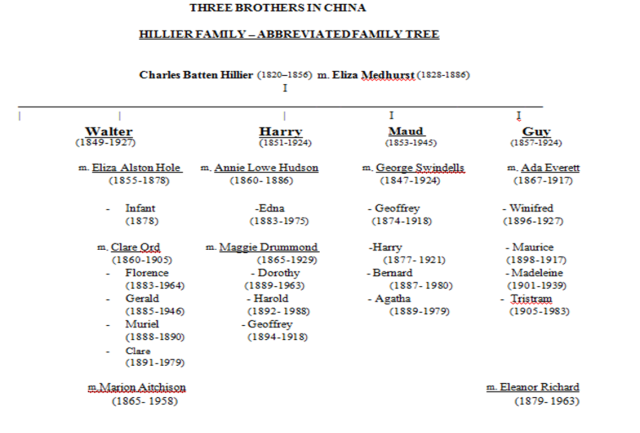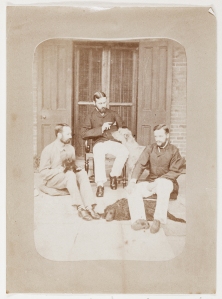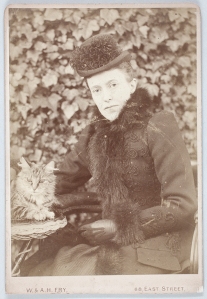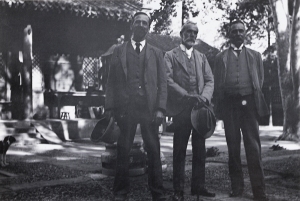Today on the FCRN we are lucky to welcome a guest post from Andrew Hillier, PhD student at the University of Bristol under Robert Bickers. Andrew is working on the history of some his own relations: Walter Medhurst (China missionary, 1819-1856), Charles Batten Hillier (Chief Magistrate of Hong Kong, 1846-1855), and the latter’s three sons: Walter, Harry and Guy.
Interest in the relationship between family and empire is consistently increasing: for recent examples, see Emma Rothschild’s The Inner Life of Empires: An Eighteenth Century History (Princeton: Princeton University Press, 2011) and Catherine Hall’s Macaulay and son, architects of imperialism (New Haven: Yale University Press, 2012). Both these works fuse the public and the private and I am seeking to build on that approach in my Ph.D. thesis, ‘Three Brothers in China: A Study of Family and Empire’: University of Bristol: supervisor, Professor Robert Bickers, author of The Scramble for China: Foreign Devils in the Qing Empire, 1832-1914 (London: Allen Lane, 2011) et al.
I am exploring how empire was shaped by family and how, in turn, family shaped the imperial discourse. Using my forbears in nineteenth and early twentieth century China as the lens, I am examining how much they were influenced by their imperial antecedents, the impact of the colonial setting on their experience of the intimate incidents of family life – birth, marriage, separation and death -and how the resulting family communion informed both their private and public lives.
Whilst I deal with earlier generations – Walter Medhurst (1796-1857), celebrated missionary and Sinologue, and his son-in-law, Charles Batten Hillier, Chief Magistrate of Hong Kong, (1846-1855) and HM Consul to Siam (1856)- the main focus is on Charles’ three sons: Sir Walter Caine Hillier, Chinese consular service (1868-1896) and thereafter various roles, culminating in his appointment as Political Adviser to the Chinese Government (1908-1910); Harry Mason Hillier (my great grand-father), Commissioner of Chinese Maritime Customs (1872-1910) and Guy Hillier, Peking Agent of the Hongkong and Shanghai Bank (1895-1924), who had responsibility for negotiating most of the major loans to China during this period, despite having gone blind early on in his career.
All three brothers spoke Chinese fluently and were keen Sino-philes. Through their reputations and influence, they built up a network of connections with Chinese officialdom, which lasted for lengthy periods and gave them significant advantages in the way they operated in Britain’s informal empire.
At present, my approach is underpinned by two particular themes. First, the way that the increasing emphasis on the notion of masculinity, with which the imperial enterprise was associated, informed their private lives and their attitude to their families (both wives and children). Secondly, the way that through their sensibility to China, they were each able to establish long-term collaborative relationships with Chinese officials which embedded Britain’s presence in China but also gave rise to criticism from Westerners at the time and still remains the subject of stringent criticism by Chinese scholars today.
The study concludes by examining the legacy of this process, in terms of how the brothers continued to promote ‘Britain in China’ in their later lives and what they handed on to the next generation. Whilst at least five Hillier women married and lived in China well into the 1920s, the men were a different story. Their early careers were cut short by their enthusiasm to join up and fight in this most imperial of wars. Three of the four cousins of the next generation were killed on active service. Harry’s son (my grandfather), Harold Hillier, was the only one to survive.
The scholarship in this area is of course voluminous but I found Elizabeth Buettner’s Empire Families: Britons and Late Imperial India (Oxford: Oxford University Press, 2004) invaluable as a starting-off point. In terms of the Hilliers, whilst there are references to the three brothers scattered through published work, I am mainly relying upon primary material, some of which is in the family archive. Harold Hillier was a keen genealogist and assembled a large stock of papers, including letters, diaries and photographs, which are providing a rich source. In addition, through Bristol University’s China-based projects – Historical Photographs of China: http://hpc.vcea.net/ and Chinese Maritime Customs: http://www.bristol.ac.uk/history/customs/, a number of fascinating private archives have come to light, including diaries and letters relating to the Hilliers.
The public archives are extremely fertile even though there are difficulties accessing the Chinese archives relating to the CMC. The principal ones – the National Archives, the archives at SOAS and those at HSBC -provide ample material relating to the three ‘imperial’ institutions in which the public careers of the three brothers were played out.
Coming to the subject relatively late in life (I was a practising barrister for 40 years), I was amazed and excited to find how active the scholarship in this area is. The barrister’s training in terms of the ability to discipline material and distil specific issues has been important but information overload remains a constant problem. A key task is to remain detached, which means ensuring not only that all relevant material is scrupulously analysed but also that the personal aspects of their lives, however interesting, are put to one side, unless they add to the central argument of the thesis. In this respect, the process at Bristol where, each term, PhD. students researching in this area meet together and discuss their work along with Professor Bickers is extremely helpful. My colleagues are kind but strict critics!
I would be extremely interested to hear from anyone researching in these areas.
Andrew Hillier
May 2014





Hi Andrew,
Could I please get your email address? My grandfather Guy was Madeleine’s son, under Todd. We’re still dispatched across the world. Guy’s children live in Antigua, my brother (Andrew) is in Antibes and I am in South Africa.
In anticipation 🙂
Hi Kathryn
I’m mortified to think I haven’t replied. For some reason I never saw this (blogging’s not my scene generally!) Anyway it’s good to make contact at last! John Holliday put me onto this. I’m in touch with quite a lot of the Todd family- have photos etc – Guy T was a fascinating character & Madeleine v. tragic – incredibly beautiful – will send you details once we’ve established email contact – so do reply. If you have some family tree do send it.
best wishes
Andrew
Hi Andrew
I’m writing a book on the period in Thailand when your ancestor, C B Hillier, was British Consul. Could we establish email contact?
Best regards
Simon Landy
Hi Andrew,
My great grandfather is George Medhurst Saul,the son of Martha Medhurst & Robert Powell Saul..Could you please provide me your email address & looking forward to communicate with you.
Pingback: SHANGHAILANDERS AND THE QUEST FOR HOME | Family & Colonialism Research Network
While working on the diaries of Sir Ernest Satow (1843-1929: diplomat and scholar) for publication from Cengage in Singapore, I came across not only Medhurst but also Hillier (Walter, Guy and Ada) mentioned by Satow. One recent example is the entry August 17 1917: “The death of Mrs. Guy Hillier in London at a nursing home is announced.”
I am looking forward to getting in touch with you, for I am interested in your Ph.D. and other papers on Medhurst and Hillier. Your family history approach to China and long residents there is highly appeciated for outside scholars like me.
Sincerely yours
Shinichi Miyazawa
My Mother’s maiden name was Medhurst-Saul. She was born in Iloilo, Philippines on 2 June 1925, the youngest of three sisters. Her Father was Walter Medhurst Saul (born 1889), his Father was George Medhurst Saul (1851-1928). Both are mentioned in the ‘Directory and Chronicle of China, Japan, Corea (sic), Indo-China, Straits’ etc for the years 1908 & 1912 under Iloilo for Hoskyn & Co, Merchants. George Medhurst Saul was born in Liverpool in 1851.
My Mother is thriving and will be 92 on 2 June 2017. She lives in East Sussex at Herstmonceux Place.
Hello!
It’s been a long time,I’ve been trying to find any descendant’s & relatives from my SAUL family.So you’re the grandchild of Lolo Walter Emil?What’s your Mom’s name?My Mom’s remembered only her cousins Aunt Pat & Aunt Junnie.
Please give me your email address so I can email you privately.I’m happy finding a 2nd cousin from far.Our regards to your Mom.Hopimg to hear from you soon.
@jmkenziehall
Hello!It’s a mixed emotion when I read a message from you.I’m not sure if my previous comment on this thread had reached you.Anyway,if your grandfather is Lolo (Filipino term for grandpa)Walter Emil Medhurst Saul,I’m glad to know a 2nd cousin from far.What’s your mom’s name.My mother remembers her cousins Aunt Pat & Aunt Junnie.Please give me your email address so I can send a message to you privately.We have a lot of catching up as 2nd cousins.
Always,
Amna(Lovelyn)
Amna Lovelia Noelly Saul Tabang
amnalove.tabang1214@gmail.com
I read this with great interest as Clare born 1891was my Great Grandmother. I have a photo of Walter that has been handed down through the family.
Simon Graham
Hello!Andrew
I am a doctoral student in Macao, who is studying the Chinese textbook written by Walter. I’ve been sorting out some relevant information about the author and his family recently. I was surprised to meet your article on the Internet!!! I hope to communicate with you if I have a chance.
xiongye0211@gmail.com